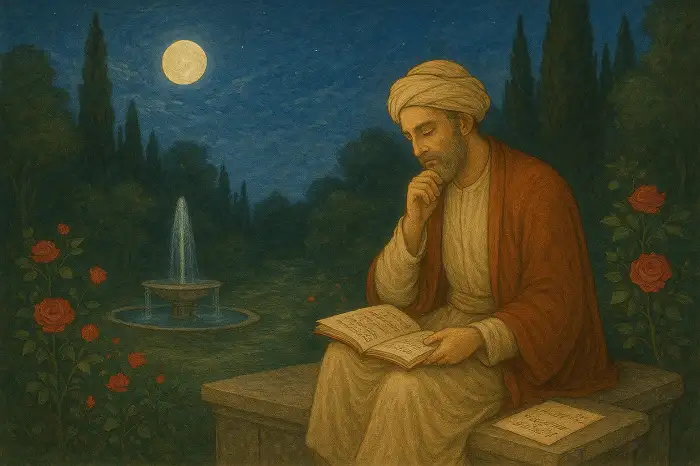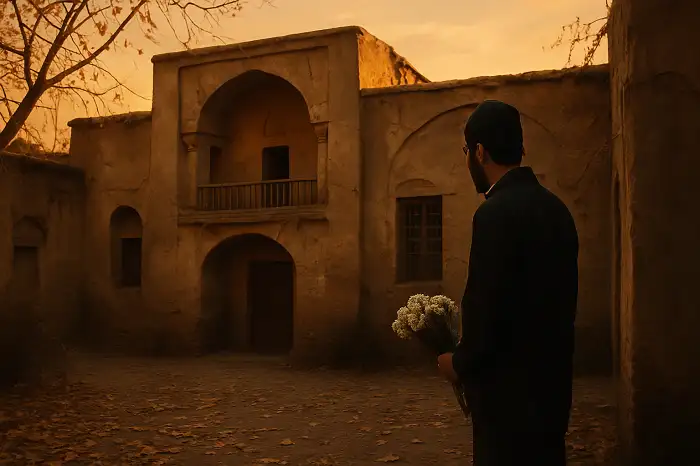Table of Contents
This exquisite Persian sonnet by the renowned 13th-century poet Sa’di Shirazi explores the overwhelming power of love and the emotional turmoil it brings. Sa’di masterfully blends imagery, emotion, and philosophical depth in this ghazal, expressing how love defies reason and control. This post presents the original Persian verses alongside English phonetics and accurate translations to make the poem accessible for non-Persian speakers and lovers of classical poetry worldwide.
Video of Sa’di Shirazi’s Sonnet on Timeless Love
Sa’di Shirazi’s Sonnet on Love – Persian, Phonetics & Translation
هزار جهد بکردم که سر عشق بپوشم
/hezār jahd bekardam ke ser-e ‘eshq bepusham/
I made a thousand efforts to conceal the secret of love,
نبود بر سر آتش میسرم که نجوشم
/nabud bar sar-e ātash moyassar-am ke najusham/
But it wasn’t possible to sit on fire and not boil over.
به هوش بودم از اول که دل به کس نسپارم
/be hūsh budam az avval ke del be kas nasepāram/
From the beginning, I was wise not to give my heart to anyone,
شمایل تو بدیدم نه صبر ماند و نه هوشم
/shamāyel-e to bedidam, na sabr mānd o na hūsham/
But when I saw your beauty, I lost both my patience and wisdom.
حکایتی ز دهانت به گوش جان من آمد
/hekāyati ze dahānat be gūsh-e jān-e man āmad/
A tale from your lips reached the ears of my soul,
دگر نصیحت مردم حکایت است به گوشم
/degār nasīhat-e mardom hekāyat ast be gūsham/
Now, people’s advice sounds like mere stories to me.
مگر تو روی بپوشی و فتنه بازنشانی
/magar to rūy bepushi o fetne bāz neshāni/
Unless you hide your face and end the turmoil,
که من قرار ندارم که دیده از تو بپوشم
/ke man qarār nadāram ke dīde az to bepusham/
For I cannot make my eyes turn away from you.
من رمیدهدل آن به که در سماع نیایم
/man-e ramide-del ān be ke dar samā‘ nayāyam/
With my fearful heart, it’s better I don’t join the dance,
که گر به پای درآیم به در برند به دوشم
/ke gar be pāy darāyam, be dar barand be dusham/
For if I enter the circle, they’ll carry me out on their shoulders.
بیا به صلح من امروز در کنار من امشب
/biyā be solh-e man emruz, dar kenār-e man emshab/
Come make peace with me today, stay by my side tonight,
که دیده خواب نکردهست از انتظار تو دوشم
/ke dīde khāb nakarde ast az entezār-e to dusham/
For last night, my eyes didn’t sleep, awaiting your arrival.
مرا به هیچ بدادی و من هنوز بر آنم
/marā be hīch bedādi o man hanūz bar ānam/
You deemed me worthless, yet I still believe
که از وجود تو مویی به عالمی نفروشم
/ke az vojud-e to mūyi be ‘ālamī nafurosham/
That I wouldn’t sell a strand of your being for the world.
به زخمخورده حکایت کنم ز دست جراحت
/be zakhm-khorde hekāyat konam ze dast-e jerāhat/
Let me, the wounded, tell of my pain from the blow,
که تندرست، ملامت کند چو من بخروشم
/ke tandorost, malāmat konad cho man bekhoru:sham/
For the healthy reproach me when I cry out in agony.
مرا مگوی که سعدی طریق عشق رها کن
/marā magūy ke Sa‘dī tarīq-e ‘eshq rahā kon/
Don’t tell me, Sa’di, to give up the path of love,
سخن چه فایده گفتن چو پند میننیوشم؟
/sokhan che fāyde goftan cho pand mi-nanīusham?/
What’s the use of talking if I don’t heed the advice?
به راه بادیه رفتن به از نشستن باطل
/be rāh-e bādiye raftan beh az neshastan-e bāṭel/
Better to journey through the desert than sit idle,
و گر مراد نیابم به قدر وسع بکوشم
/O gar morād nayābam, be qadr-e vos‘a bekūsham/
And even if I don’t reach my goal, I’ll strive to my best.
About the Poem: A Cry of Love and Longing

This powerful ghazal or sonnet غزل by Sa’di Shirazi is a profound expression of the emotional storm that love can ignite. The speaker struggles to conceal his feelings, yet the fire of love burns too intensely to be hidden. Each verse illustrates a different facet of the lover’s helplessness, desire, and resistance—eventually surrendering to the overwhelming presence of the beloved. Sa’di masterfully blends metaphor and imagery, making the reader feel both the ecstasy and agony of unfulfilled love. The poem walks the line between spiritual longing and human emotion, a hallmark of classical Persian poetry.

The beloved in this sonnet becomes both a symbol of divine beauty and a human muse, making the poem resonate on multiple levels. From sleepless nights to the loss of reason, Sa’di portrays love as an uncontrollable force that strips the lover of pride, composure, and logic. Yet even in despair, the speaker remains devoted, refusing to trade a single strand of the beloved’s existence for all the riches in the world. This duality of pain and devotion is what gives the poem its timeless depth and emotional intensity.
About the Poet: Sa’di Shirazi

Sa’di Shirazi (c. 1210 – c. 1292) was one of the most influential and celebrated poets of medieval Persia. Born in Shiraz during a time of political upheaval and Mongol invasions, he traveled extensively throughout the Islamic world—from Anatolia to India—and his experiences shaped much of his philosophical and poetic thought. He is best known for his two monumental works, the Bustan بوستان (The Orchard) and the Gulistan گلستان (The Rose Garden), which blend poetry and prose to explore themes of ethics, love, wisdom, and human behavior.

Sa’di’s poetry is distinguished by its moral clarity, lyrical beauty, and universal themes. He had a unique ability to distill complex ideas into simple, elegant language that remains deeply resonant even centuries later. In Persian culture and beyond, Sa’di is not only a literary figure but also a moral teacher whose verses are often quoted in everyday speech. His works are celebrated for their humanism, insight, and the timeless quality of his reflections on life.




با سپاس فراوان از جناب آقای دکتر علیرضا پیمان گرامی، نویسنده این مقاله و گوینده فایل صوتی درباره یکی از غزلیات سعدی شیرازی